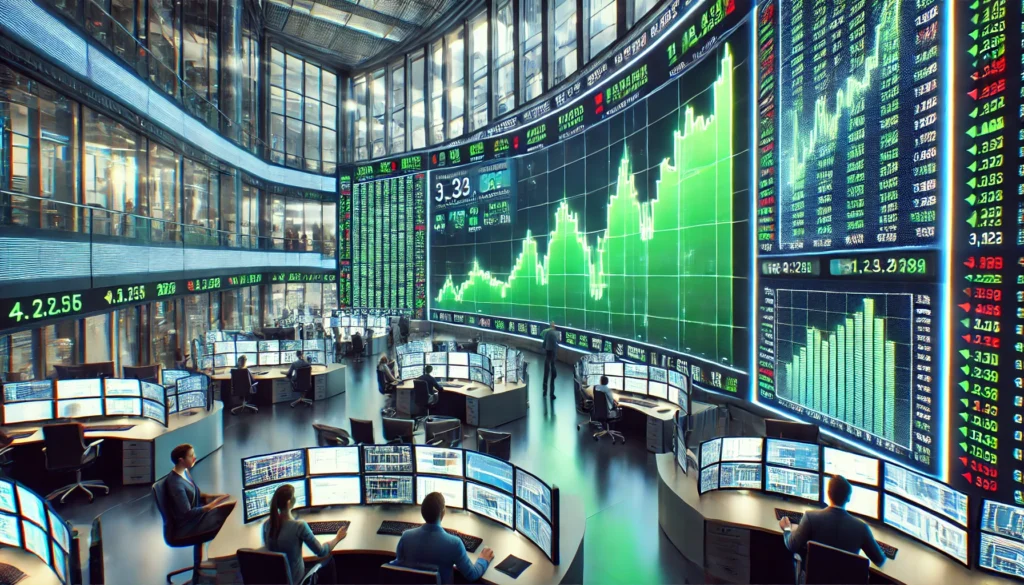European equity markets continue to surge, reaching new highs despite escalating fears of a US-EU trade war. On Tuesday, major benchmarks like the Euro Stoxx 600 and Germany’s DAX climbed 0.23% and 0.58%, respectively, marking their second consecutive day of record gains. The DAX has emerged as a global standout, rallying over 10% year-to-date, while the US Nasdaq has managed only a 1.72% gain.
The resilience of European markets comes despite US President Donald Trump’s imposition of 25% tariffs on steel and aluminum imports, a move that has raised concerns about a widening trade conflict. European Commission President Ursula von der Leyen has vowed to respond with “proportionate countermeasures,” but investors appear unfazed, focusing instead on the region’s strong fundamentals and supportive policies.

Trump’s Tariffs Risk Backfiring as European Car Stocks Gain
Trump’s tariffs, aimed at protecting US industries, may inadvertently benefit European automakers. Ford CEO Jim Farley warned that the 25% tariffs on Canada and Mexico could “blow a hole” in the US car industry, giving Asian and European rivals a competitive edge. This sentiment is reflected in market performance: the Stoxx Europe 600 Automobiles & Parts Index has gained 5% this year, while the Dow Jones US Automobiles Index has plummeted 13%.
Analysts argue that tariffs could backfire on the US economy by increasing consumer prices and discouraging investment. Higher import costs may also force central banks to maintain elevated interest rates, further stifling growth. In contrast, European markets are benefiting from a more accommodative monetary policy and robust industrial performance.
ECB’s Dovish Stance vs. Fed’s Hawkish Policy
A key driver of Europe’s market outperformance is the European Central Bank’s (ECB) commitment to lowering interest rates. ECB President Christine Lagarde has signaled that inflation is moving toward target levels, allowing room for further rate cuts. The ECB has already reduced borrowing costs by 1.25% since June 2024 and is expected to cut rates by at least another 75 basis points this year.
In contrast, Federal Reserve Chair Jerome Powell has maintained a hawkish stance, emphasizing that the US central bank will not rush to cut rates. Powell acknowledged that Trump’s policies could exacerbate inflationary pressures, adding to economic uncertainty. This divergence in monetary policy has likely contributed to the relative underperformance of US markets compared to their European counterparts.
EU’s €50bn AI Investment Boosts Tech Sector
Adding to the bullish sentiment, European Commission President Ursula von der Leyen announced a €50bn investment in artificial intelligence (AI) at the AI Action Summit in Paris. This brings the EU’s total AI investment to €200bn, positioning Europe as a serious competitor to the US and China in the global AI race.
The announcement provided a significant boost to the European tech sector, with the Stoxx Europe 600 Technology Index rising 0.74% on Tuesday. Shares of SAP, Europe’s largest tech firm, surged 2.41% to a record high, while Dutch chip equipment maker ASML gained nearly 1%. Year-to-date, the European tech index has rallied over 8%, outpacing the US technology sector, which has gained just 1.88%.
Shifting Investment Trends
The exceptional rally in European markets suggests a potential shift in global investment flows. Investors appear to be favoring regions with supportive policies and growth potential, moving away from the US amid economic uncertainty and trade tensions. Notably, US tech shares have lost momentum following the launch of an open-source AI model by Chinese startup DeepSeek, which offers a cost-effective alternative to expensive hyperscaler solutions.
Conclusion
Despite the looming threat of a US-EU trade war, European markets continue to thrive, driven by accommodative monetary policies, strong industrial performance, and strategic investments in technology. As Trump’s tariffs risk backfiring on the US economy, Europe’s resilience highlights its growing appeal as a destination for global capital. With the ECB’s dovish stance and the EU’s ambitious AI investment plan, European markets are well-positioned to maintain their upward trajectory in the face of global uncertainties.



